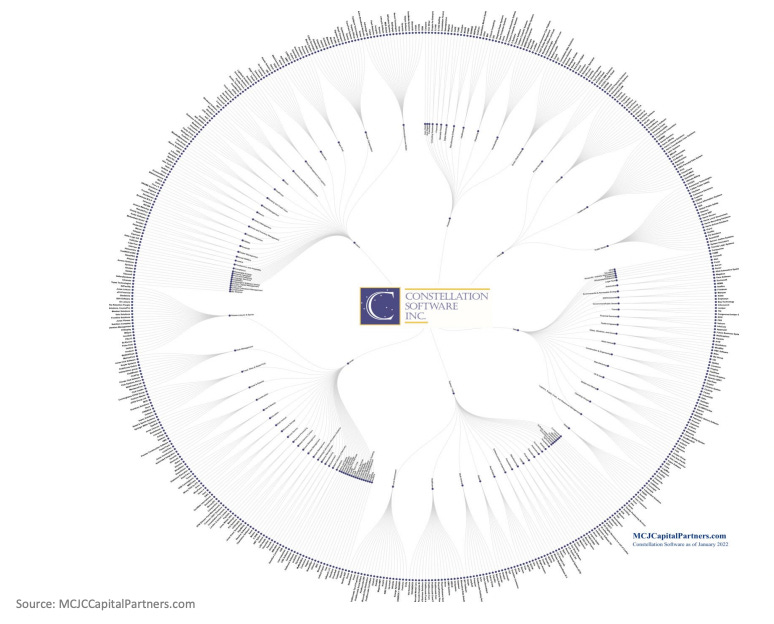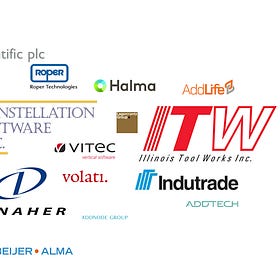For the last few months, I have been diving deep into the intersection of private and public markets, and I keep coming back to the idea of micro-acquisition funds or serial acquirers. These are a hybrid of venture studios, conglomerates, acquisition arms, and capital allocators like Warren Buffet and Henry Singleton.
It changes the conventional way we look at company building, shareholder returns, and value creation. In the most traditional sense, we see value creation by the business as improving the existing operation of the business. Hence, we see founders, CEOs, and management teams as operators. I hear from founders and operators that they don’t know what investing is like. Philosophically, I found the argument quite counter-intuitive because, for a very long time, I saw the primary role of a CEO, management team, and founders as resource allocators. To go further on this, the resource allocator in terms of doing capital allocation and human resource allocation. The capital allocation piece of the puzzle is exceptionally critical in understanding the role of a founder or a CEO, which is not just to run operations but also to allocate capital.
"Essentially, capital allocation is investment, and as a result, all CEOs are both capital allocators and investors [and operators].” -
The Outsiders [Book]
In terms of publicly listed companies, skilled capital allocation is critical for value creation for shareholders & society at large. There are five levers of capital allocation that any CEO can use, which are as follows:
Buy Backs » This is something Henry Singleton from Teledyne mastered; he was one of the most aggressive buyers of his Teledyne shares. Recently, Warren Buffet also started buying back Berkshire Hathway shares. It is a great lever to increase shareholder returns when the CEO/founder thinks the stock is undervalued; hence, reducing the number of shares increases the value per share.
“He (Henry Singleton) aggressively repurchased his stock (Teledyne), eventually buying in over 90 percent of Teledyne’s shares” -
The Outsiders [Book]
Acquisitions » Many investors, especially from the US, see acquisitions as a net value destroyer rather than a value creator. I tend to agree that, in most cases, it is yes. Still, acquisition machines or disciplined acquisition can be a great lever to create shareholder value and value for society in general. My favorite example is Constellation Software. Mark Leonard started buying tiny family-owned vertical market SaaS companies, and he built the Constellation software empire only by serial acquisitions. The critical distinction between serial acquirers and acquisitions that destroy value is that serial acquirers are disciplined. They use the lever continuously to build value, and they don’t do acquisition for optics or integration but for access to free cash flow and keeping it decentralized. Serial acquisitions make the company more resilient and, in some sense, mimic nature and organic growth; rather than focusing on finding rockets, they focused on finding the Zebras and bringing several 100 Zebras together.
“Teledyne is like a living plant, with our companies the different branches and each putting our new branches and growing so that no business is too significant.” -
Henry Singleton, founder of Teledyne
“Acquisition decisions are based on stand-alone valuations and should be accretive to earnings without restructuring or synergies.” - REQ Capital
Existing Ops, R&D, NPD (new product development), etc. » This lever is what all companies and CEOs focus on. It is pretty self-explanatory. I will only highlight optimizing the free cash flow over-optimizing for net income/earnings.
“For long long-term investors, the key factors to monitor is high cash flow generation, maintaining stable or increasing margins, adopting a prudent approach and M&A, proving that the growth is durable and upholding an overall sound risk profile.” - REQ Capital.
Dividends » I am not a big fan of dividends, but they make sense when a company cannot prudently allocate capital to generate higher ROIC (return on invested capital). Hence, a company that doesn’t know what to do with the excess capital can never compound higher than the market (S&P 500 as an example). I see dividends as a lazy way to attract investors to buy company stock.
Paying off debt » In the first place, the company shouldn’t ideally rely a lot on debt, whether for existing operations or acquisition; it should mostly be done with free cash flow, and when debt is used, it should be monitored with free cash flow. However, if the company has debt, it should actively pay off its debt and other liabilities, improving the debt-to-equity ratio and debt-to-free cash flow ratio.
“The heads of many companies are not skilled in capital allocation. Their inadequacy is not surprising. Most bosses rise to the top because they have excelled in an area such as marketing, production, engineering, administration, or sometimes, institutional politics. Once they become CEOs, they now must make capital allocation decisions, a critical job that they have never tackled and that is not easily mastered.” - Warren Buffet
“Despite its importance, there are no courses on the capital allocation at the top business schools” - The Outsiders [Book]
CEOs have four sources to tap in for capital for growth »
Free Cash Flow » In financial accounting, free cash flow (FCF) or free cash flow to firm (FCFF) is the amount by which a business's operating cash flow exceeds its working capital needs and expenditures on fixed assets (known as capital expenditures)1. I personally think FCF is the best source of capital as it is readily available to company to use it to increase the total shareholder value. It’s management is critical for long-term compounding.
Issuing debt » By issuing debt (e.g., corporate bonds), companies are able to raise capital from investors. Using debt, the company becomes a borrower and the bondholders of the issue are the creditors (lenders). Unlike equity capital, debt does not involve diluting the ownership of the firm and does not carry voting rights2. Debt is a liability, it is important to maintain and monitor debt to FCF and debt to equity ratio and how it impacts the return on invested capital. It should be used cautiusly.
Issuing shares to raise equity » Raising capital through the selling of shares is known as equity financing. A company that sells shares effectively sells ownership in their company in exchange for cash. When a company raises funds in this way, it is referred to as issuing equity3. Additional equity financing increases the number of outstanding shares for a company. The result can dilute the value of the stock for existing shareholders4. It can destroy value for existing shareholders if they get too diluted, so it needs to be used cautiously in relation to the growth of the company in terms of price to earnings ratio and overall growth of the company.
Divestments » If an investment area is underperforming expectations, the best CEOs don't throw good money after bad - they cut bait and reallocate that capital towards more promising initiatives. They can decisively deploy resources to accelerate growth if an unexpected opportunity arises. In this regard, great entrepreneurs must have the objectivity of professional investors combined with the operational chops to execute a strategy.
I want to leave with some resources on capital allocation.
Book - Capital Allocation and Value Creation: A Market-Based Framework for Executives by Torbjörn Arenbo
Book - The Outsiders : Eight Unconventional CEOs And Their Radically Rational Blueprint For Success by WILLIAM N THORNDIKE
Book - Distant force : a memoir of the Teledyne Corporation and the man who created it, with an introduction to Teledyne Technologies by Roberts, G. A. (George Adam)
Podcast - Investing by the Books #60 Torbjörn Arenbo: Capital Allocation and Value Creation
Article - Decoding Capital Allocation by Peter Westberg
Article - The Art of Capital Allocation By Sebastian Stange, Ulrich Pidun, Alexander Roos, and Martin Link
Have you read my some pieces from the Not VC series, please give it a read and share!
The case for micro acquisition funds
As an operator turned impact investor and venture capitalist, I tend to view assets through a business lens, echoing Warren Buffet’s perspective that
Serial Acquirer
Nearly a year ago, I became fascinated with the concept of serial acquirers or acquisition compounders. These are essentially decentralized conglomerates that grow through a steady stream of acquisitions, often micro-acquisitions. What intrigues them is that they view themselves not as operators or managers but as capital allocators and investors.
Lone Wolf
As an introvert (I believe so, though some think I am an extrovert, sorry, I don’t want to hang out with you. I need my Kindle and let me go to nature and cut off from people), I'm drawn to the concept of solo fund managers. I romanticize it because of the autonomy, accountability, and active role that appeals to me. By solo fund managers, I don’t mean …
Not VC
Off to a slow & intentional start to the year 2024. For a while, I have not penned down an article; I felt there was some writer’s block. By the way, I am not a writer in any way.
Sign-off for humanity,
Sagar
Follow me on LinkedIn» https://www.linkedin.com/in/sagartandon/
Mail me at » sagar@firstfollowers.co / sagar@beyondimpact.vc
Stay humble, stay curious 🌟🌟🌟!
Note: These are my personal opinion.
Free cash flow, Wikipedia
Debt Issue, Investopedia
Raising capital and issuing equity, explained, Orchestra.io
How Does Additional Equity Financing Affect Existing Shareholders?, Investopedia








